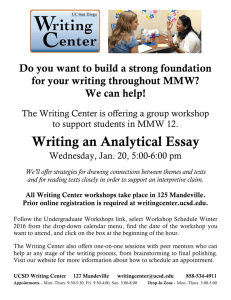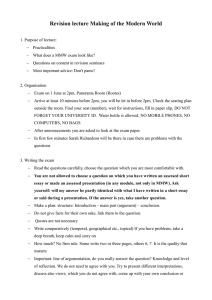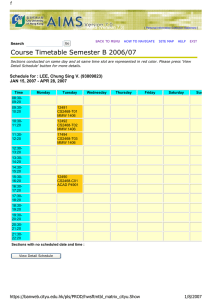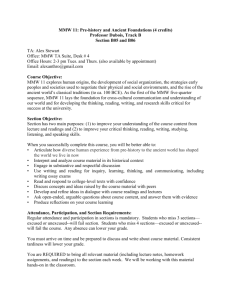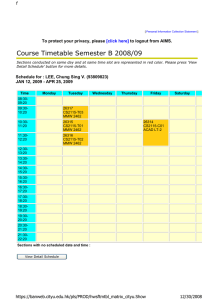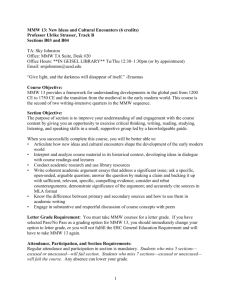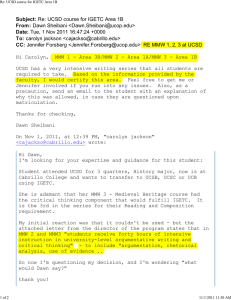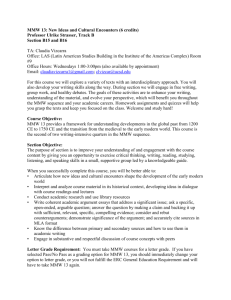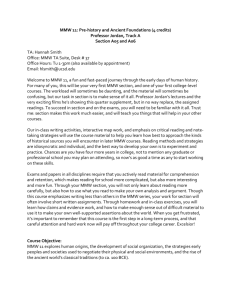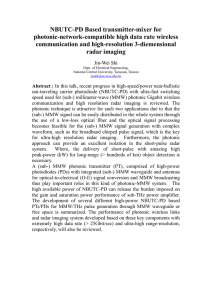1 MMW 13: New Ideas and Cultural Encounters (6 credits)
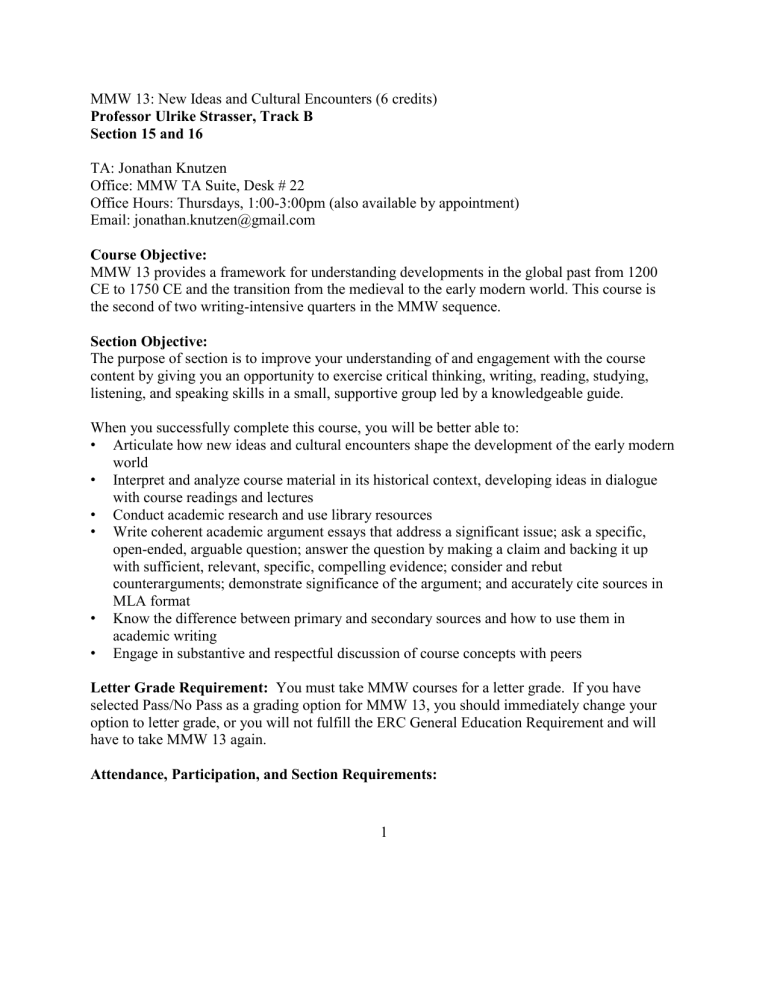
MMW 13: New Ideas and Cultural Encounters (6 credits)
Professor Ulrike Strasser, Track B
Section 15 and 16
TA: Jonathan Knutzen
Office: MMW TA Suite, Desk # 22
Office Hours: Thursdays, 1:00-3:00pm (also available by appointment)
Email: jonathan.knutzen@gmail.com
Course Objective:
MMW 13 provides a framework for understanding developments in the global past from 1200
CE to 1750 CE and the transition from the medieval to the early modern world. This course is the second of two writing-intensive quarters in the MMW sequence.
Section Objective:
The purpose of section is to improve your understanding of and engagement with the course content by giving you an opportunity to exercise critical thinking, writing, reading, studying, listening, and speaking skills in a small, supportive group led by a knowledgeable guide.
When you successfully complete this course, you will be better able to:
•
Articulate how new ideas and cultural encounters shape the development of the early modern world
•
Interpret and analyze course material in its historical context, developing ideas in dialogue with course readings and lectures
•
Conduct academic research and use library resources
•
Write coherent academic argument essays that address a significant issue; ask a specific, open-ended, arguable question; answer the question by making a claim and backing it up with sufficient, relevant, specific, compelling evidence; consider and rebut counterarguments; demonstrate significance of the argument; and accurately cite sources in
MLA format
•
Know the difference between primary and secondary sources and how to use them in academic writing
•
Engage in substantive and respectful discussion of course concepts with peers
Letter Grade Requirement: You must take MMW courses for a letter grade. If you have selected Pass/No Pass as a grading option for MMW 13, you should immediately change your option to letter grade, or you will not fulfill the ERC General Education Requirement and will have to take MMW 13 again.
Attendance, Participation, and Section Requirements:
1
Regular attendance and participation in section is mandatory. Students who miss 5 sections— excused or unexcused--will fail section. Students who miss 7 sections—excused or unexcused-- will fail the course. Any absence can lower your grade.
You must arrive on time and be prepared to discuss and write about course material. Consistent tardiness will lower your grade.
You are REQUIRED to bring any relevant material to the section each week. We will be working with this material hands-on in the classroom.
Homework, Quizzes, In-Class Work:
Grading :
Section counts for 10% of the overall class grade. The grade will be computed as a function of two factors: attendance and participation. If you miss more than 2 sections, you cannot get an A; if you miss more than 5 you get an F. The default participation grade is an A. I assume everyone will participate regularly and constructively in discussion. Discussion will often take place within small groups and, although you are encouraged to speak up in plenary sessions, you are not required to do so in order to get an A for participation. There is no algorithm for determining departures from the default participation grade: frequency and quality of non-participation (e.g. not adequately participating in group work, surfing the web, distracting others, and so on) will lower the grade accordingly.
Writing Assignments and Late Policy:
In MMW 13, you are required to write an academic research paper in 5 stages. The assignments will build your research skills and argumentative writing skills. Assignments will be covered in section, along with the MMW “Style Sheet” for guidelines on how to format and submit your papers. Failure to meet ALL criteria for writing assignments will result in the loss of points.
All papers must be turned in directly as a hard copy to me in section, lecture, or office hours, in addition to an electronic copy uploaded to www.turnitin.com. Papers left in my mailbox or the
MMW office will not be graded . You will lose one-third of a letter grade for each day a paper is late (including weekends). If you are unable to attend section the day the paper is due, you must make other arrangements to submit your work. In addition to taking the mid-term and final exams and attending section regularly, you must submit ALL writing assignments (both as a hard copy to me and to turnitin.com) in order to pass the course.
Classroom Environment:
I want us to be a genuine learning community, embarked on the adventure of learning together.
Each one of us has important things to share and contribute. It is important that we recognize and honor that as a community. I expect you to engage each other with utmost respect. In order to
2
facilitate an environment conducive to learning, cell phones are not to be used in class.
Computers may be used to look up course-related material online from the course website and for no other purpose.
Communicating with Me/Office Hours/Email/Piazza:
The best way to communicate with me is by email. I will not generally check my email after 9pm and if you need to ask me a question about something, it is best not to wait until the last minute.
Please note, too, that in general, it is important that you use proper communication etiquette in your emails with your professors and TAs. You should address the individual to whom you write and, certainly, include your name at the end.
Course Resources:
Course Website:
MMW13 Homepage: http://roosevelt.ucsd.edu/mmw/courses/mmw13.html
UCSD Writing Center: http://writingcenter.ucsd.edu/
The Cornell Note-taking System (in case you need help with note-taking): http://lsc.sas.cornell.edu/Sidebars/Study_Skills_Resources/cornellsystem.pdf
Counseling and Psychological Services (CAPS):
College life can be stressful, and it is normal to feel overwhelmed at times. UCSD has a staff of professionals that are available for confidential meetings to discuss any personal concerns you might have. Feel free to contact CAPS at anytime to set up an appointment: http://psychservices.ucsd.edu/#students
Academic Integrity: You are responsible for the honesty and integrity of your academic work at
UCSD. The University has a strict policy prohibiting cheating of any kind. If you are suspected of cheating, you will be required to meet with an academic coordinator, who will them discuss your case with the professor. If the professor charges you with misconduct, the professor will determine the penalty for your grade in the course, which can range from deductions to failing the paper, section, or the course. Then you will have to meet with the Dean of Student Affairs, who will determine additional penalties, which can range from failing the course and taking an academic integrity seminar to suspension to expulsion.
Throughout this process, a hold will be put on your grade. Even a first offense can result in a quarter’s suspension, and the standard sanction for a second offense is suspension or permanent dismissal from the university. Any instance of academic misconduct can be recorded in a student’s file. Such a record might interfere with a student’s acceptance into law, medical, or graduate school, or might make that student ineligible for positions requiring a security clearance, such as a government internship.
3
In brief, the University’s
Policy on Integrity of Scholarship states that students are expected to complete the course in compliance with the instructor’s standards. No student shall engage in any activity that involves attempting to receive a grade by means other than honest effort; for example:
1.
No student shall knowingly procure, provide, or accept any unauthorized material that contains questions, or answers to any examination or assignment to be given at a subsequent time.
2.
No student shall complete, in part or in total, any examination nor assignment for another person.
3.
No student shall knowingly allow any examination or assignment to be completed, in part or in total, for himself or herself by another person.
4.
No student shall plagiarize or copy the work of another person and submit it as his or her own work.
5.
No student shall employ aids excluded by the instructor in undertaking course work or in completing any exam or assignment.
6.
No student shall alter graded class assignments or examinations and then resubmit them for regrading.
7.
No student shall submit substantially the same material in more than one course without prior authorization.
Please read the full Policy: http://students.ucsd.edu/academics/academicintegrity/policy.html
. If you have any questions, ask me.
4
